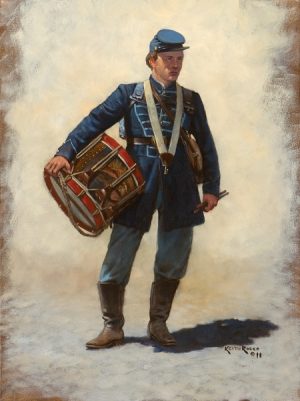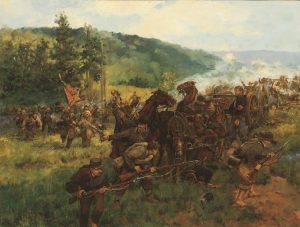50 signed and numbered prints
It was April 3, 1865. After ten grueling and bloody months, Union forces under General Ulysses S. Grant had at last broken the Confederate lines surrounding Petersburg, Virginia and entered the Cockade City. Among those following the army into the city was President Abraham Lincoln, who was elated at Grant’s success and anxious to see the place that had so long defied all efforts to capture it.
The ride to Petersburg took the party through ground the armies had fought over only the day before. Casualties were still scattered about. As they passed by some of the mangled dead the President’s personal bodyguard, William H. Crook, saw Lincoln’s face settle “into its old lines of sadness.”[1] No one felt the tragedy of the war more than Lincoln. Yet, as the end of that war now approached he sought no vengeance or retribution toward the Confederates. The war had wreaked vengeance and suffering enough on both sides. Just a month before, in his second inaugural address, he laid out his view of the war’s end:
With malice toward none, with charity for all, with firmness in the right as God gives us to see the right, let us strive on to finish the work we are in, to bind up the nation’s wounds, to care for him who shall have borne the battle and for his widow and his orphan, to do all which may achieve and cherish a just and lasting peace among ourselves and with all nations.[2]
Lincoln had the courage to tell his countrymen what they needed to hear rather than what they wanted or expected on more than one occasion. He had done so earlier, in November 1863, at Gettysburg, where in his Gettysburg Address he defined what the war was about. At its heart it was a question of whether a nation conceived in liberty and “dedicated to the proposition that all men are created equal” could survive. The Vice President of the Confederate states had declared that his government was “founded upon exactly the opposite idea; its foundations are laid, its corner- stone rests, upon the great truth that the negro is not equal to the white man; that slavery, subordination to the superior race is his natural and normal condition.” Even in the North, Lincoln faced fierce hostility from some parts of the population to his views and policies. An Ohio newspaper editor raged that the President’s notions on emancipation and equality were “insulting to God as to man, for it declares those ‘equal’ whom God created unequal.”[3]
To Lincoln, slavery was the very antithesis of the principles the Founding Fathers had declared the United States stood for. Slavery’s convenience and the vast economic wealth invested in it had caused the country to stray from its founding principles and find accommodation with it. The defenders of slavery declared that equality, liberty, and citizenship, applied to the white man only, and in the 1857 Dred Scott decision the Supreme Court of the United States declared that blacks were “so far inferior that they had no rights which the white man was bound to respect,” and could not be the citizen of any state. The nation was like a ship that had strayed off course. Lincoln sought to right the course, to lead the country to what he called, “a new birth of freedom.”
Despite immense hurdles and opposition, Lincoln would not compromise on the preservation of the Union or the destruction of slavery. There would be no peace without these achievements. He achieved slavery’s demise just over a month before his visit to Petersburg when Congress passed the 13th Amendment to the U.S. Constitution abolishing slavery in the United States. Now, in April 1865, the Confederacy was tottering to its end. On April 4 Lincoln visited the recently abandoned Confederate capital, Richmond. Throngs of now free black people crowded about him during the visit. When one man dropped to his knees in front of Lincoln and exclaimed, “Bless the Lord, there is the great Messiah!” the President gently corrected the man. “Don’t kneel to me,” he said, “That is not right. You must kneel to God only, and thank him for the liberty you will hereafter enjoy.”[4]
Five days later, on April 9, the President returned to Washington. During the night he learned from Grant that Lee had surrendered the Army of Northern Virginia that day at Appomattox Court House, Virginia. The war, for all intents and purpose, was over for it was only a matter of time before the other Confederate field armies surrendered. Lincoln had achieved two immense accomplishments; he had preserved the Union and destroyed slavery. The road ahead would be filled with disappointments and setbacks but Lincoln had set the example and charted the course for who we could be as a country.
Gettysburg, Pennsylvania
[1] Doris Kearns Goodwin, Team of Rivals (New York: Simon and Shuster, 2005), 716.
[2] http://www.ourdocuments.gov/doc.php?flash=true&doc=38 (accessed May, 2015)
[3] James McPherson, Battle Cry of Freedom (New York: Oxford Univ. Press, 1988), 595.
[4] Donald, Lincoln, 576.
| Medium | |
|---|---|
| Size | 18" x 24", 12" x 16" |
| Type |



